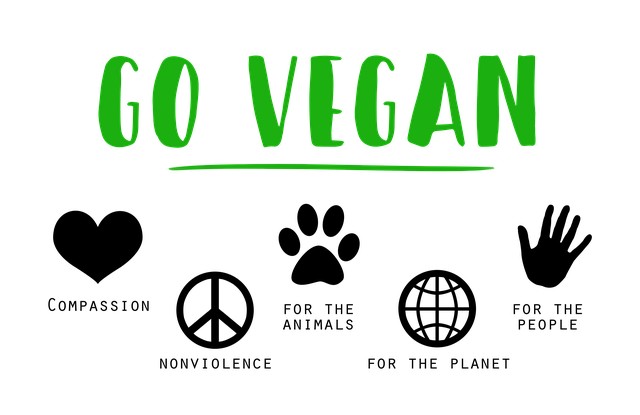1. Introduction to Veganism:
Veganism, a lifestyle gaining global momentum, goes beyond a dietary choice, encompassing ethical, environmental, and health considerations. At its core, veganism rejects the consumption and use of animal products, emphasizing a commitment to a more compassionate and sustainable existence.
The defining principle of veganism is rooted in ethical considerations. Advocates assert that animals possess inherent value and deserve to live free from exploitation. This ethical stance extends to opposing not only the consumption of meat but also practices such as factory farming and animal testing.
Environmental consciousness is another key pillar of veganism. The livestock industry is a significant contributor to deforestation, greenhouse gas emissions, and resource depletion. By adopting a vegan lifestyle, individuals aim to minimize their environmental footprint, promoting a more sustainable coexistence with the planet.
Health reasons also play a pivotal role in the adoption of veganism. A well-balanced vegan diet can provide essential nutrients while potentially reducing the risk of chronic diseases. With an emphasis on plant-based foods, this lifestyle choice promotes overall well-being.
2. History of Veganism
Veganism, coined in 1944 by Donald Watson, traces its roots to ancient ethical and health-based practices. In the 19th century, vegetarian movements gained traction, emphasizing plant-based diets. The Vegan Society, founded in 1944, formally defined veganism as avoiding all animal exploitation. Post-World War II, veganism expanded, driven by concerns about animal welfare, health, and the environment.

The 1970s and 1980s saw increased advocacy, linking veganism with countercultural movements. In the 21st century, documentaries, social media, and celebrity endorsements propelled veganism into the mainstream, highlighting its ethical, environmental, and health benefits. Today, veganism is a global lifestyle encompassing dietary choices and consumer goods, promoting a cruelty-free approach to minimize harm to animals and the planet. The movement reflects a broader shift towards sustainable and conscientious living.
3. Definition of Veganism:
Veganism is a lifestyle and dietary choice characterized by the abstention from the use and consumption of animal products. Those who adhere to veganism, known as vegans, consciously avoid not only meat but also dairy, eggs, honey, and any other substances derived from animals. The essence of veganism lies in a commitment to exclude all forms of animal exploitation from one’s daily life.
At its core, veganism is a philosophy guided by the belief that animals have intrinsic value and should not be subjected to harm or exploitation for human purposes. This principle extends beyond dietary practices and often influences choices related to clothing, personal care products, and other aspects of daily living. The Vegan Society, founded in 1944, coined the term “vegan” and provided the first formal definition, emphasizing the exclusion of all forms of animal exploitation.
Vegans actively seek alternatives that align with their commitment to ethical, environmental, and health considerations. The movement continues to grow, driven by a desire to create a world where individuals can thrive without compromising the well-being of animals or the planet. As veganism evolves, it becomes not just a dietary choice but a holistic lifestyle centered on compassion, sustainability, and conscious living.

For example, opting for plant-based milk instead of cow’s milk or choosing cruelty-free cosmetics are practical manifestations of veganism. The movement continues to grow, driven by a desire to create a world where individuals can thrive without compromising the well-being of animals or the planet. As veganism evolves, it becomes not just a dietary choice but a holistic lifestyle centered on compassion, sustainability, and conscious living
4. Core Principles of Veganism
Ethical Considerations: Central to veganism is a profound ethical stance regarding the treatment of animals. Vegans believe in the intrinsic value of sentient beings, advocating for a world where animals are not exploited for food, clothing, experimentation, or any other human purposes. This ethical commitment extends to opposing practices like factory farming, emphasizing the need for humane treatment.

Environmental Consciousness: The core principles of veganism extend beyond animal welfare to encompass environmental sustainability. Recognizing the significant environmental impact of the livestock industry, vegans strive to minimize their ecological footprint by abstaining from animal products. This approach aims to mitigate climate change by reducing greenhouse gas emissions and promoting a more resource-efficient lifestyle.
Health and Well-being: A commitment to personal health is another fundamental aspect of veganism. Advocates argue that a well-planned, plant-based diet can provide all necessary nutrients, contributing to lower risks of chronic diseases such as heart disease, diabetes, and certain cancers. The emphasis on whole, plant-based foods in a vegan diet can also aid in weight management due to lower saturated fat intake and higher fiber content.

5. Why to choose Vegan Diet:
5.1 Health Reasons for Veganism:
Embracing a vegan lifestyle is often motivated by compelling health reasons, prominently among them being a reduced risk of chronic diseases and effective weight management. Research indicates that adopting a well-balanced plant-based diet can significantly contribute to overall well-being and lower the likelihood of various health issues.

One of the standout health benefits associated with veganism is a reduced risk of chronic diseases, particularly those affecting the cardiovascular system. Plant-based diets, rich in fruits, vegetables, whole grains, nuts, and seeds, naturally contain lower levels of saturated fats and cholesterol. These dietary components are known contributors to heart-related problems such as coronary artery disease and hypertension. By prioritizing plant-based sources of nutrition, individuals can positively impact their cardiovascular health, reducing the risk of heart diseases and promoting a stronger, more resilient circulatory system.
Vegans often experience improved blood sugar control, leading to a decreased risk of type 2 diabetes. The emphasis on complex carbohydrates found in fruits, vegetables, and whole grains, coupled with the fiber content in these foods, aids in regulating blood glucose levels. Maintaining stable blood sugar is crucial for diabetes prevention, and a plant-based diet has shown efficacy in this regard. Additionally, the diet’s potential to enhance insulin sensitivity may offer protective benefits against the development of diabetes.
Beyond cardiovascular health and diabetes prevention, adopting a vegan lifestyle has been linked to a potential reduction in the risk of certain types of cancers. Studies suggest that diets high in red and processed meats are associated with an increased risk of colorectal and other cancers. By excluding these animal products and emphasizing plant-based alternatives, individuals may decrease their exposure to carcinogenic compounds, contributing to a lower risk of cancer development.

Weight management is another noteworthy health benefit associated with veganism. The emphasis on nutrient-dense, plant-based foods contributes to a diet with lower calorie density. Plant-based diets often naturally lead to lower calorie consumption, aiding in weight loss or maintenance. Moreover, the focus on whole foods, high fiber content, and reduced intake of processed foods can enhance feelings of fullness and satiety, promoting healthier eating habits.
The vegan approach to weight management extends beyond calorie considerations. Research suggests that individuals following a vegan diet tend to have lower body mass indexes (BMIs) and lower rates of obesity compared to those following non-vegetarian diets. This correlation is attributed to the dietary patterns inherent in veganism, emphasizing foods that are generally lower in energy density and higher in essential nutrients.
5.2 Environmental Reasons for Veganism:
Choosing a vegan lifestyle for environmental reasons involves making decisions that aim to lessen the impact of human activities on the planet. The livestock industry, which produces meat and other animal products, is a big contributor to environmental problems. Factory farming, in particular, leads to deforestation, water pollution, and lots of greenhouse gas emissions that harm the Earth.
By going vegan, people hope to reduce their “carbon footprint,” which means lowering the amount of harmful gases released into the air. Additionally, it’s about saving resources. The land, water, and food used to raise animals for food could be used more efficiently to grow plant-based foods.
Reducing carbon footprint means lessening the impact we have on the Earth’s atmosphere. It’s like our environmental “footprint,” showing how much we contribute to climate change by releasing greenhouse gases. These gases, like carbon dioxide, trap heat in the atmosphere, leading to global warming.

Choosing a lifestyle that reduces our carbon footprint involves making mindful decisions to minimize activities that release these gases. One significant way is by adopting a plant-based diet. Unlike the production of animal products, which often involves deforestation and methane emissions from livestock, plant-based foods generally have a lower environmental impact.
Another key aspect is energy consumption. Using energy-efficient appliances, reducing waste, and supporting renewable energy sources all contribute to a smaller carbon footprint. Additionally, opting for sustainable transportation, such as walking, biking, or using electric vehicles, further reduces our impact on the environment.

For example, choosing a vegan burger instead of a beef burger is like saying “no” to the environmental impact caused by raising cows for meat. It’s a small change that, when many people make it, can add up to a big positive impact on our planet. Imagine a world where what we eat doesn’t harm the environment as much. That’s what environmental reasons for veganism are all about—making choices that help keep the Earth healthy for everyone.
6. Ethical Reasons for Veganism:
Choosing a vegan lifestyle is a conscientious decision to align personal choices with a compassionate worldview, actively contributing to the reduction of demand for products associated with animal suffering. This ethical stance extends beyond diet, influencing various aspects of daily life, promoting a more humane and compassionate existence.
5.1 Animal Welfare
Animal welfare encompasses the ethical responsibility to ensure the well-being of sentient beings. It emphasizes the humane treatment of animals, acknowledging their capacity to experience pain, joy, and a range of emotions. In the context of animal agriculture, practices like factory farming raise concerns about confined spaces and harsh conditions, compromising the welfare of livestock.

Advocates for animal welfare strive to raise awareness, promote legislation, and encourage practices that prioritize the health and happiness of animals. For example, choosing plant-based alternatives over products from factory farming is a tangible way individuals can align with principles of animal welfare, fostering a more compassionate and respectful coexistence with other species.
6.2 Opposition to Animal Testing
Opposing animal testing is all about saying “no” to using animals in scientific experiments. People who care about this think it’s not right to make animals suffer for our tests. They believe animals have rights and should be treated kindly. Instead of using animals, they want scientists to find different ways to do experiments, like using computers or special lab dishes.
For example, when you see a product labeled as “cruelty-free,” it means it wasn’t tested on animals. Many people choose these products because they want to support a world where animals aren’t harmed for the things we use. It’s like saying, “Let’s find smart and kind ways to do science and make products without making animals go through tough times.” This opposition to animal testing is part of a bigger movement where people want progress but not at the expense of animals’ well-being.
Conclusion: Healthier life with Vegan Diet
Health reasons for adopting a vegan lifestyle, particularly the reduced risk of chronic diseases and effective weight management, underscore the potential benefits of prioritizing plant-based nutrition. The evidence suggests that making conscious dietary choices aligning with vegan principles can contribute not only to personal well-being but also to the prevention of prevalent health concerns, fostering a holistic and proactive approach to health.
Choosing a plant-based protein source like lentils instead of red meat not only supports weight management but also reduces the intake of saturated fats linked to cardiovascular issues, showcasing how dietary choices impact health outcomes in tangible ways.


